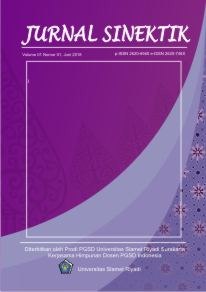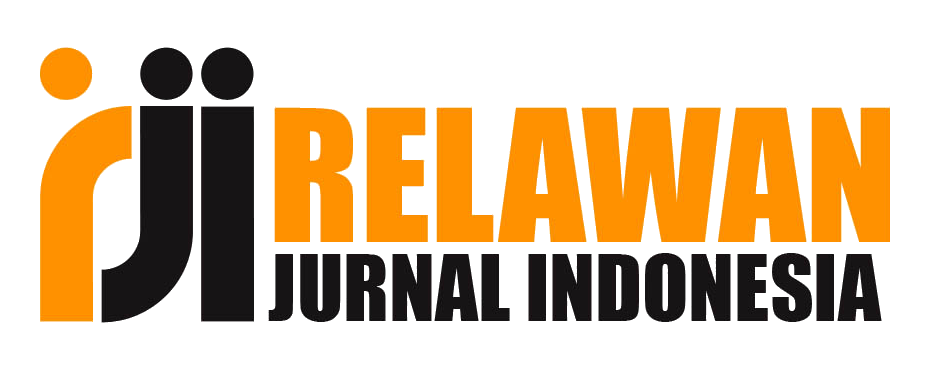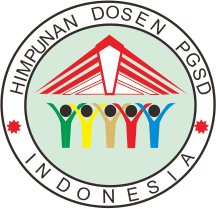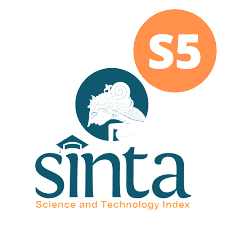IMPLEMENTASI MODEL PROJECT BASED LEARNING DALAM MENINGKATKAN HASIL BELAJAR SISWA KELAS III SDN PANGGUNG LOR
DOI:
https://doi.org/10.33061/js.v7i1.9045Keywords:
learning outcomes, project based learningAbstract
This study aims to improve the cognitive learning outcomes of class III students at SDN Panggung Lor Semarang city for the 2022–2023 school year on the theme of rights and obligations through the project-based learning (PjBL) learning model. The subjects in this study were class III students at SDN Panggung Lor Semarang City, consisting of 11 female students and 17 male students. The technique of collecting data is done by giving tests and making observations. The results showed that the average class III student learning outcomes in cycle I were 68.28 and increased to 83.21 in cycle II. The percentage of students who complete the KKM has increased with each cycle. In cycle I, the percentage of students who completed the KKM was 39.29%, and then it increased in cycle II to 83.21%. These results indicate that the application of the project-based learning (PjBL) learning model can improve the cognitive learning outcomes of class III students at SDN Panggung Lor Semarang City on the theme of rights and obligations
References
Almulla, M. A. (2020). The Effectiveness Of The Project-Based Learning (PBL) Approach As A Way To Engage Students In Learning. SAGE Open, 10(3).
Almuzhir, A. (2022). Penerapan Model Pembelajaran Project Based Learning dapat Meningkatkan Hasil Belajar Siswa Kelas IX Semester Ganjil pada Bimbingan TIK tentang Penggunaan Dasar Internet atau Intranet di SMP Negeri 1 Marisa Tahun Pelajaran 2021/2022. Dikmas: Jurnal Pendidikan Masyarakat Dan Pengabdian, 2(2), 425. https://doi.org/10.37905/dikmas.2.2.425-436.2022
Dewi, M. R. (2022). Kelebihan dan Kekurangan Project-based Learning untuk Penguatan Profil Pelajar Pancasila Kurikulum Merdeka. Ejournal UPI, 19(2), 213–226.
Fadhilah, & Rahmawati, R. (2022). Model Project Based Learning dalam Meningkatkan Kemampuan Kerjasama di TK IT Aljannah. Serambi Konstruktivis, 4(2), 347–358.
Fahlevi, M. R. (2022). Kajian Project Based Blended Learning Sebagai Model Pembelajaran Pasca Pandemi dan Bentuk Implementasi Kurikulum Merdeka. Sustainable Jurnal Kajian Mutu Pendidikan, 5(2), 230–249. https://doi.org/10.32923/kjmp.v5i2.2714
Kunandar. (2016). Langkah Mudah Penelitian Tindakan Kelas Sebagai Pengemabnagan Profesi Guru. PT. Raja Grafindo Persada.
Maisarah, & Lena, M. S. (2021). Penerapan Model Project Based Learning ( Pjbl ) Pada Application Of The Project Based Learning ( PjBL ) Model. Jurnal Pendidikan Tambusai, IV(5), 93–115.
Musayyidi. (2023). Implementasi Strategi Pembelajaran Ekspositori Di Madrasah (Tinjauan Aktualisasi Manajemen Pembelajaran dalam Manajemen Pendidikan Islam). IJEMA: Indonesian of Educational Management and Administratism, 56–66.
Nugraha, M. I., Tuken, R., & Hakim, A. (2021). Penerapan Model Pembelajaran Project Based Learning Untuk Meningkatkan Hasil Belajar Pada Siswa Sekolah Dasar Implementation of Project Based Learning Model to Improve Learning Outcomes in Elementary School Students. Pinisi: Journal of Education, 1(2), 142–167.
Nurpitasari, E., Arianti, E. A., & Bhakti, P. C. (2018). Model Project Based Learning Untuk Meningkatkan Creative Thinking Siswa di Abstrack Abstrak. Sendika Fkip Uad, II(1), 55–62. http://seminar.uad.ac.id/index.php/sendika/article/view/3581
Redhana, I. W. (2019). Mengembangkan Keterampilan Abad Ke-21 Dalam Pembelajaran Kimia. Jurnal Inovasi Pendidikan Kimia, 13(1).
Widiarso, E. (2017). Inovasi Belajar Berbasis Life Skill. Ar-ruz Media.
Downloads
Published
How to Cite
Issue
Section
License
Copyright (c) 2023 Jurnal Sinektik

This work is licensed under a Creative Commons Attribution-NonCommercial 4.0 International License.
Authors who publish this journal agree to the following terms:
- Authors retain copyright and grant the journal right of first publication with the work simultaneously licensed under a Creative Commons Attribution License that allows others to share the work with an acknowledgement of the work's authorship and initial publication in this journal.
- Authors can separately make additional contractual arrangements for non-exclusive distribution published by the journal (e.g., publish it in a book), with an acknowledgement of its initial publication in this journal.
- Authors are allowed and encouraged to send their work via online (e.g., in the institutional repositories or their website) after published by the journal.














